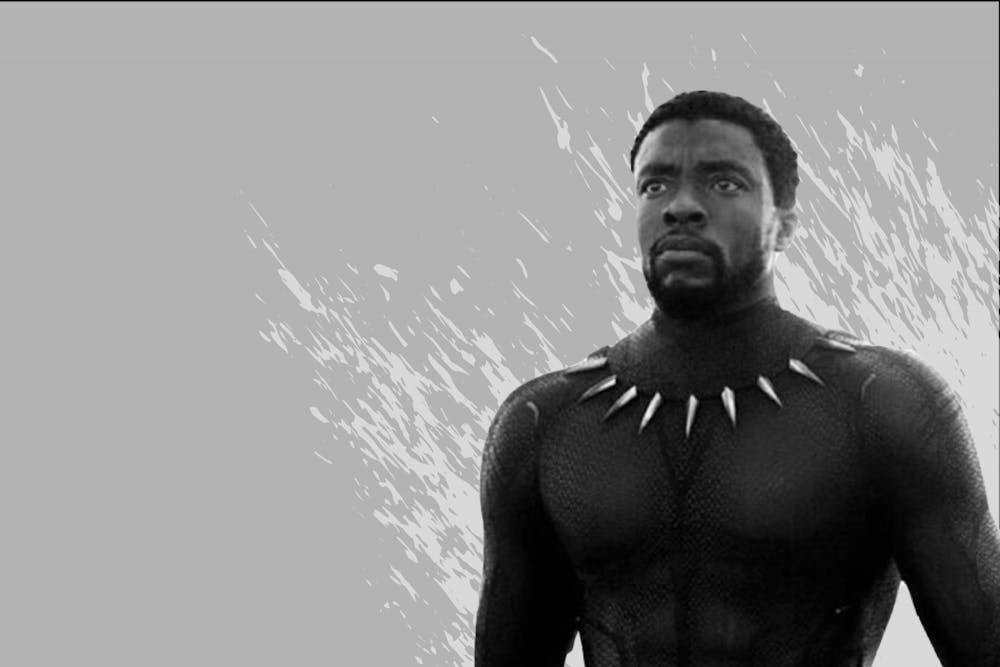On August 28th, 2020, the news of Chadwick Boseman’s tragic passing broke the heart of a young Black boy from Saint Louis, Missouri named Kian. Standing beside his Avengers action figures lined up against his garage door, he folded his arms over his chest to resemble Boseman’s famous “Wakanda Forever”; a memorial for the fallen King.
Another young Black boy, featured on Viola Davis’ Instagram page, wept beside his Black Panther action figures, embracing himself in the same “Wakanda Forever” pose.
A young girl wore a pink “Wakanda Forever” t-shirt to her (online) classes.
In a year of such pain, such heartbreak, and such loss, King T’Challa was taken from the world. From learning how to navigate a global pandemic to crying desperately for racial justice, people are understanding how their actions directly contribute to the world, from something as simple as wearing a mask to something as fundamental as protesting for human rights. What Boseman gave to the world is bravery, strength, and a legacy that must be carried on.
To pay homage to the iconic and necessary movie, I revisited the Black Panther Soundtrack in hopes of learning more about its genesis and where all the artists are today.
Other Chadwick Boseman fans had the same idea: the Black Panther Soundtrack jumped 104% in song streams in the first two days following Boseman’s death, with over 3.5 million streams from U.S. consumers.
Composer Ludwig Göransson traveled to Africa and toured with Senegalese musician Baaba Maal to research traditional West African music. Snippets of talking drums and tambin recordings are laced throughout the soundtrack, the latter being used in the score for the main theme. The sounds combined mimicked the word T’Challa. Göransson discovered that “music from Africa is a language” and the artists featured on the soundtrack told a story of love, pain, and desire—all in an authentic voice.
"Pray for Me", a hit track featuring lead vocals from Kendrick Lamar and The Weeknd explores the hero’s burden from the perspective of the protagonist, King T’Challa. The Weeknd loops “Who gon’ pray for me? Take my pain for me? Save my soul for me?” But in the verse to follow, Lamar enters, strong and confident, rapping “I fight the world…I fight pain and hurricanes, today I wept..if I gotta be sacrificed for the greater good, then that’s what it gotta be.”
Through their individual crafts, Boseman, Lamar, and The Weeknd express the struggles of being a ‘hero’ in their fight to support the marginalized communities by articulating the weight of symbolizing a movement. Regardless, the struggle must go on. As Boseman once said, “Whatever you choose for a career path, remember the struggles along the way are only meant to shape you for your purpose...As you commence to your paths, press on with pride and press on with purpose.” Black artists must “press on” and carry on the legacy of King T’Challa.
Kendrick Lamar uses his lyricism, sung poetry, and superstardom to provoke difficult conversations on race in America. His music is political. His lyrical authenticity and rhythmic dynamism fuse together to explore the realities of being Black in today’s world. As a Pulitzer Prize recipient—the first rapper and Black Hip-Hop artist to be honored—his award–winning lyrics written are now featured in the IB English literature curriculum, its inclusion marking a renewed interest in Black literature and a desire to diversify the Canon.
In 2016, The Weeknd donated $50,000 to the University of Toronto to launch a course on Geʽez , the traditional language of Ethiopia. He later donated more to support the Ethiopic Studies program. A compulsive philanthropist, he's also donated $200,000 to Black Lives Matter Global Network and $100,000 to National Bail Out in June of 2020 during the national protests against racial injustice, amongst others. On Twitter, he urged “industry partners and execs'' to support organizations that support racial equality, a call–to–action as discussions centering around the music industry’s exploitation of Black artist came to light. In August 2020, he held a virtual concert on TikTok and raised over $350,000 for the Equal Justice Initiative, a nonprofit dedicated towards providing legal representation for wrongly convicted prisoners and those who have been denied fair trial.
Through the lens of its biggest stars' commitment to racial justice, the Black Panther Soundtrack becomes more background music to a collection of action–packed scenes. It's a full–bodied ode to Black excellence, becoming more timely as this summer found that very notion under attack.
Other artists featured in the soundtrack, like Jorja Smith, have also worked toward fighting racial injustice. Featured on “I Am,” she released a new single in August titled “By Any Means” to raise awareness about social justice issues, reflecting on her experiences with the Black Lives Matter movement. Her music video features candid footage and photographs of Black individuals staring in the camera as she sings plainly powerful lyrics: “I will fight for you.”
Black Panther gave Black artists a platform to tell their side of history. It galvanized a collective of artists to lead conversations on race and identity in mainstream cinema and the music industry. Boseman synthesized the pride, suffering, and courage of these artists into his performance. He “was an epic firework on display,” constantly studying and improving, according to Black Panther Director Ryan Coogler. He was kind. He laughed. He was self–assured. While the public looked at Boseman for representation, leadership, answers, a key point was missed. Boseman was never meant to be a monolith. He didn’t want to be the only hero. As Kendrick Lamar proclaimed in “Pray For Me”, “Who need a hero? You need a hero, look in the mirror.” His bravery paved the way for the young boys and girls—like the ones mentioned earlier—to be heroes of tomorrow.







